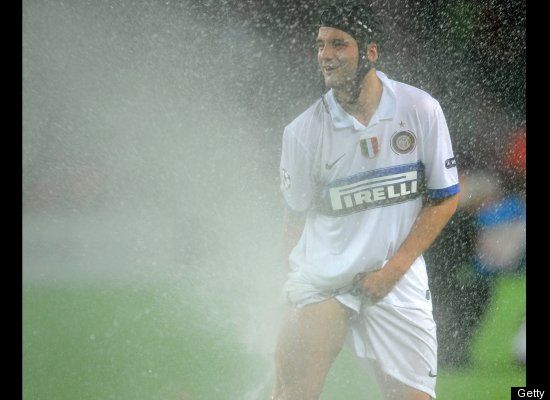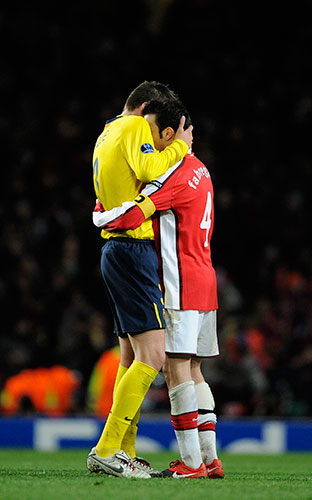
I never thought that F.C. Barcelona would ever take a page from Auburn's playbook on handling defeat at home, but there you go. I would not have been opposed to turning the water hoses on Jose Mourinho specifically after his disgraceful "look at me!!! I'm the king!!!" performance after the final whistle. A coach who advanced by parking the bus from the opening minute - conceding 86% possession to the opponent and instructing his players to waste time from the word go (Julio Cesar was wasting time on goal kicks from the second minute) - and was a bad handball call from going out doesn't need to be acting like MacArthur. Jose should remember what happened the last time his side knocked Barca out of the Champions League; the Blaugrana returned the favor with interest the next year. Good for Inter; good for their long-suffering fans; good for Lucio, Samuel, Zanetti, and Cambiasso, all of whom are consummate professionals; good for Sneijder, who has become a fantastic trequartista; good for Julio Cesar, an outstanding keeper; and good for Eto'o, whose departure from Catalunya is looking like a bigger mistake with each game that goes by. But f*** Inter's manager.
Other thoughts:
1. Could Zlatan be more useless? I don't think he's a big game bottler; I think he doesn't run, regardless of the opponent. How is it that Barca were more dangerous in both matches when they hauled off the second most expensive player in the world? Bojan isn't the greatest at this stage in his development, but Barca were immediately better when they brought him on because he was, you know, making runs. Zlatan is a Swedish giant, so how is it that mighty mite Bojan found himself on the end of a header in front of goal after an inch-perfect Messi cross (and admittedly fluffed the chance), but Ibra couldn't do the same? Where is this Plan B we were promised? Barca lost this tie when they couldn't sign David Villa over the summer. Villa wouldn't bring Plan B, but he's the best in the world at playing Barca's Plan A: quick passes on the ground to fast guys making runs in the spaces between defenders. Can Man City take Ibra off of the Blaugrana's hands? They seem to have a fetish for striker with bad attitudes.
[Update: Pep is thinking along the same lines.]
2. If Barca didn't have the reigning and future Ballon D'Or winner in the side, Gerard Pique would have a good chance of being the team MVP. He was often on an island against Diego Milito when Barca pushed forward and he was perfect. Then, with all of Barca's attackers misfiring, he scored the goal that put Barca on the front foot for the last ten minutes. I'd be impressed by a striker who had the presence of mind to pivot when one on one with the keeper so as to cause the keeper and an onrushing defender to take themselves out of position; I'm floored by the fact that a center back thought to do that. If Pique isn't first choice for La Furia this summer (even if Puyol is relegated to the bench), then Vincente del Bosque is making a huge mistake.
3. The season now comes down to two matches: the road games against Villarreal and Sevilla on the next two weekends. Barring an absolute stunner in which Barca drops points to a relegation side, Barca's La Liga campaign will come down to not dropping points at two venues that have been complicated in the past. Being the first team to repeat as Champions League winners and doing so at the Bernabeu would have been great, but winning La Liga over the most expensively assembled side in history would be a nice silver medal, especially when Real have dropped all of ten points out of 96 available against teams not named Barcelona.
4. I was pessimistic about Barca's chances in the second leg because top quality sides have shown time and again that they can negate Barca by parking the bus at the Nou Camp. In chess terms, opponents can always trade queens with the Blaugrana, neutering themselves and their opponents at the same time. Don't believe me? Here are the scores of the home legs of Barca's semifinals in the Rijkaard/Guardiola era:
2006 - Barca 0 Milan 0
2008 - Barca 0 Manchester United 0
2009 - Barca 0 Chelsea 0
2010 - Barca 1 Inter 0
Credit to Inter for being able to pull it off because there aren't many sides in the world with the back line and Makeleles to pull the feat off. (Thankfully, Real Madrid are not one of them. Watch them spend 60M Euros on Samuel and Lucio now.) I'll still maintain that it is an admission of inferiority by squads of this quality when they deploy players like Eto'o, Rooney, or Malouda as auxiliary defenders. Barca may have been knocked out, but they remain unchallenged. Other elite teams refuse to play at the Nou Camp. Hence the title of this post.
